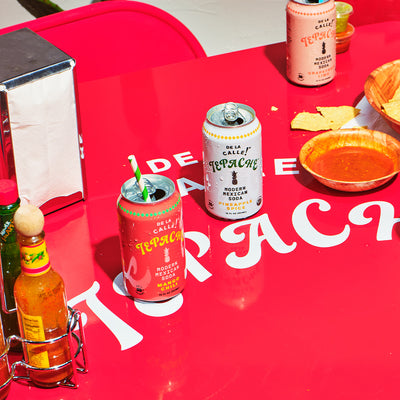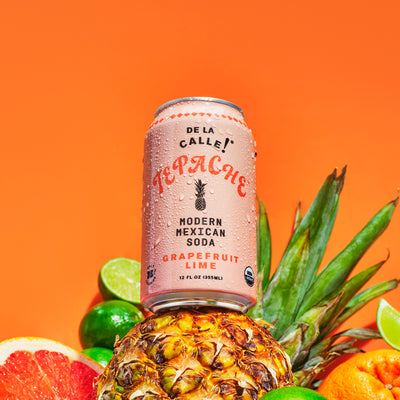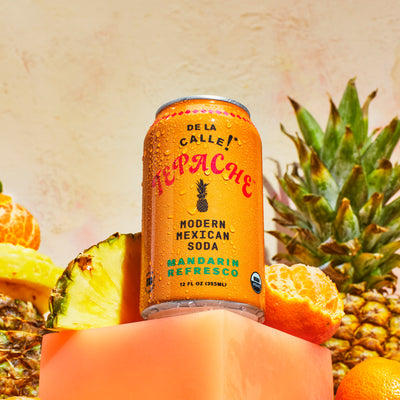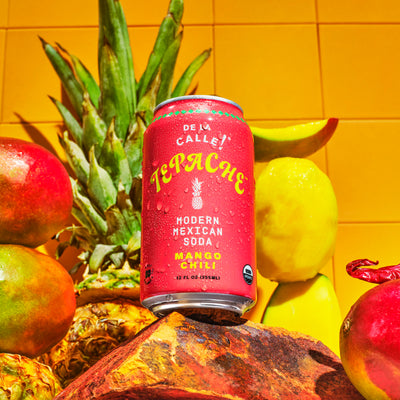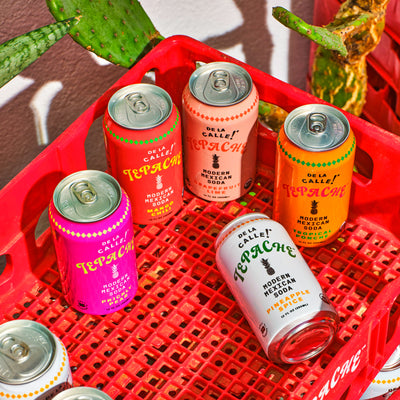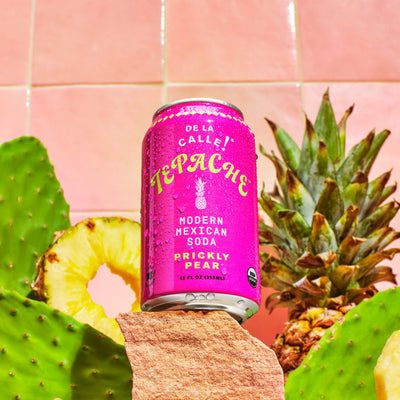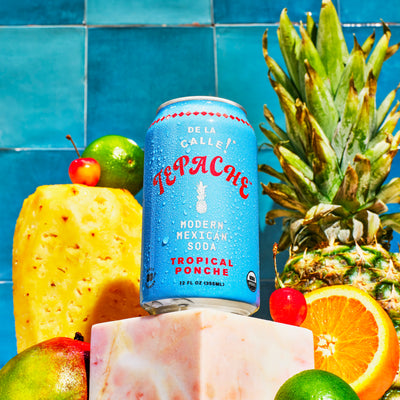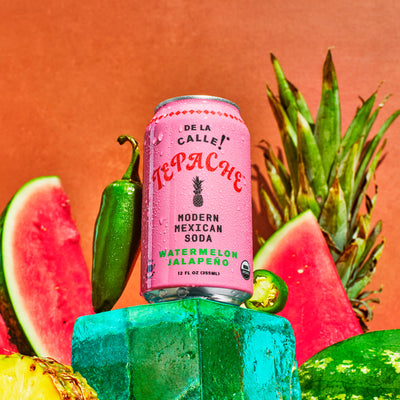Olipop & De La Calle’s Tepache: What Makes Them Different

There are so many new drinks being made that claim to have health benefits that it can be difficult to keep track of what’s what and what is actually healthy. In this article, we’ll compare OLIPOP, a new soda-like drink, to De La Calle’s tepache so that you know what drink to reach for when you want to give your gut a boost.
Overview
Before we get to the differences between these two drinks, let’s take a look at an overview of each beverage. Although there are several important differences to note between these two, they both claim to be soda alternatives that are low sugar and beneficial for your gut.
What Is OLIPOP?
OLIPOP is the name given to a range of sparkling tonic drinks. There are eight different flavors of OLIPOP available, including:
- Classic Grape
- Orange Cream
- Vintage Cola
- Classic Root Beer
- Strawberry Vanilla
- Cherry Vanilla
- Orange Squeeze
- Ginger Lemon
OLIPOP is known for mixing prebiotics, fiber, and botanical extracts together to make their unique soda-like formulas.
What Is De La Calle’s Tepache?
De La Calle’s tepache is a natural beverage made from fermented pineapples. This tepache is flavored with natural ingredients such as fresh mango, apples, oranges, and a wide variety of spices.
Tepache is a drink native to pre-Columbian Mexico, and the recipe was passed down orally from generation to generation. Unlike other Mexican foods, drinks, customs, the tepache recipe was not standardized or altered by the Spanish when they conquered Mexico, so thousands of different versions exist throughout Mexico. Usually, tepache is served cold on the street as a refreshing midday break for people in cities and villages.
OLIPOP vs. De La Calle Calorie Count
One marked difference between OLIPOP and De La Calle’s tepache is the number of calories per can in each drink. Usually, soda contains about 150 calories per 12 fl oz can. This section will dive into what calories are, when they are good and when they are bad, and how many calories these two drinks contain.
What Is a Calorie?
Very simply, a calorie is just a unit of energy. Although we usually talk about calories as being unhealthy, we actually need calories to live and function because they provide us with energy. If you are an extremely active person, you need to consume more calories than someone with a more sedentary lifestyle.
That being said, not all sources of calories are equally beneficial. Given that all foods and drinks contain calories, you can choose to get calories from foods that are high in beneficial nutrients. When you get calories from food and drinks that have no nutritional value, the calories are considered “empty calories.” They are called “empty” because they do not improve your health at all and do not make you feel full, so they increase your daily calorie count without providing any benefits.
Sugary drinks such as soda and foods with solid fats such as butter are two primary sources of empty calories. For this reason, it can be beneficial to avoid drinks with lots of sugar and foods that are high in harmful fats and get your calories instead from healthy, high-calorie foods like avocados, quinoa, and olive oil.
OLIPOP vs. De La Calle Tepache
A can of OLIPOP contains, on average, 45 calories per can, whereas De La Calle’s tepache contains less than 40 calories per can.
Although this seems like a small difference, it is an important one because regulating your daily calorie intake is one of the best ways to manage your weight. Given that liquid calories are one of the easiest ways to unintentionally increase your calorie intake, it is important to find the lowest-calorie drinks available.
Prebiotics vs. Probiotics
Another major difference between OLIPOP and De La Calle Tepache is their prebiotic and probiotic qualities. One of the most recent advances in the health food world has been the introduction of prebiotic fibers and probiotic bacteria into different foods and drinks to aid the gut microbiome. This section will look at how these two drinks differ in their ability to aid and improve your digestive system.
What Is the Difference Between Prebiotics and Probiotics?
Before looking closely at OLIPOP and De La Calle Tepache, it’s important to have an overview of prebiotics and probiotics. Probiotics are bacteria that are known as “good bacteria.” Unlike the harmful bacteria that cause infection and illness, probiotic bacteria are beneficial to your health.
There is a natural population of bacteria in your gut that boosts your immune system functioning by protecting you from harmful bacteria and fungi, helps address obesity, and may improve symptoms of depression.
When you take antibiotic medication, all of the bacteria in your gut is compromised. Additionally, when you eat a high-sugar and high-fat diet, you feed the bad bacteria in your gut which allows them to colonize and grow faster than the beneficial bacteria. For this reason, it can be helpful to regularly consume probiotic foods and drinks to ensure that there is always a healthy balance between beneficial and harmful bacteria in your gut.
Prebiotics are substances that come from carbohydrates, usually dietary fibers, that provide fuel for the bacteria in your gut. Given that humans cannot digest several types of fiber, it can pass undigested through your system to your gut, where it becomes food for the bacteria. It is important to incorporate prebiotics into your diet because the bacteria are living organisms that need food, just like you.
Given that prebiotics are fuel for probiotic bacteria, it is important to incorporate them both into your diet. That being said, some foods and drinks, known as synbiotic, have both prebiotic and probiotic qualities.
OLIPOP vs. De La Calle Tepache
OLIPOP is a prebiotic drink because it contains soluble fiber and other prebiotics that serve as food for the probiotic fiber in your gut. Although it is undoubtedly beneficial to incorporate prebiotics into your diet, one of the greatest benefits of De La Calle’s tepache is that it has both prebiotic and probiotic qualities.
Given that tepache is a fermented beverage, it naturally contains good bacteria that can help you achieve a healthy bacterial equilibrium in your gut. The dietary fiber in tepache functions as fuel for that bacteria, making tepache a synbiotic beverage.
For many people, it is easiest to incorporate synbiotic foods and beverages, such as De La Calle tepache, into their diet because it allows them to boost the number of healthy bacteria in their digestive system and feed that bacteria without having to worry about eating other foods that will serve as fuel.
Conclusion
Both OLIPOP and De La Calle’s tepache are drinks that have health benefits and are good alternatives to soda. Although they both claim to be beneficial for your gut health, there are several key differences between them that make tepache a healthier option.
OLIPOP has slightly more calories per can than De La Calle’s tepache. It is a good idea to try and incorporate low-sugar, low-calorie beverages into your diet because sugary drinks are a primary source of “empty calories.” This type of calorie increases your daily calorie intake without providing any health benefits.
However, arguably the most significant difference between OLIPOP and De La Calle tepache is that OLIPOP is only a source of prebiotics while De La Calle tepache has both prebiotic and probiotic qualities, making it a synbiotic drink. Given that it is synbiotic, this type of tepache can increase the number of healthy bacteria in your gut and provide it with fuel to live and thrive.
Sources:

